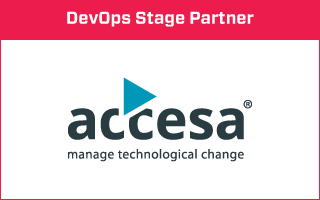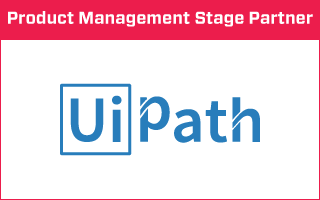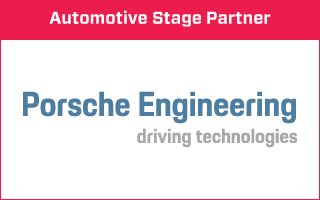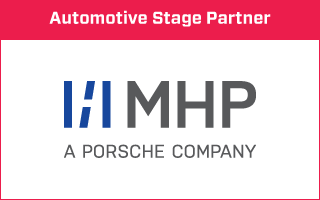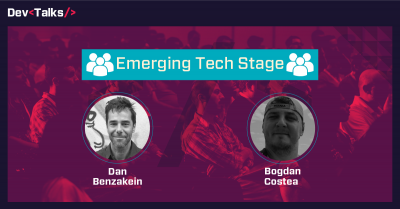
At this edition of DevTalks on the Maine Stage we will talk about the latest trends such as creating artificial intelligence solutions, the impact that technology accessibility has on users, and how developers and entrepreneurs will benefit from the changes made by virtual and augmented reality.
Come at DevTalks Cluj and meet Bogdan Costea – Software Development Lead – Xogito Group Inc. & Dan Benzakein – Founder at REALITIES, the Romanian VR & AR Think Tank who are waiting for you on Emerging Tech Stage to teach you from their experience.
Bogdan Costea – Software Development Lead – Xogito Group Inc.
1. Can you tell us more about working remote as a team lead and technical coordinator of a multinational distributed SCRUM team?
Working remote is essentially getting to do what you love from wherever you want to live, while working with top talent. You get to be close to your family and friends and you never have to spend hours in your car during rush hours. You get to work from the seaside or from your favorite sky resort. You meet great people and know their cultures. That’s the good part. There’s darkness to remote as well, not everything is cozy and that’s why they say that it’s not something that everybody can do. You get to work with people you only interact with in real life maybe once or twice a year. Some you’ll never meet. Time zones slow you down. There’s a saying that it’s always morning somewhere… that means that it’s always night somewhere as well. Your 1 PM meeting might be someone’s 7PM and someone’s 1 AM, making human interaction harder, forcing you to push verbal communication to written narrative. We solve this by adding structure and SCRUM and other practices help. Overall you get to meet new people and build great things together, wearing fluffy slippers.
2. You were a conference speaker in over 8 countries. What do you like most about being a speaker at conferences?
I love interacting with the audience during and after the talk. I like to travel so usually I attend conferences that bring me to new locations or locations that I enjoy going to. I’m actually a pretty shy person but talking about things that I care about overcomes the discomfort.
3. How do you think the Romanian IT market will evolve in the next years?
I hope that we’ll move away from this outsourcing economy into a value-producing market, where we see more and more Romanian owned, designed and developed products go international. We have a lot of highly skilled talent, we need to get more local businesses up, running and delivering high quality Romanian products.
Dan Benzakein – Founder at REALITIES, the Romanian VR & AR Think Tank
1. You are the founder of Realities, the Romanian VR & AR Think Tank. How did you decide to come in Romania with this project?
When I moved to Romania 3 years ago, I started to connect with people involved in VR/AR projects in Bucharest. While I met some really interesting developers, entrepreneurs and project builders from a wide range of industries (architecture, entertainment, art, education, healthcare, marketing…), it seemed to me they were a bit isolated. The idea of Realities came as a natural way of trying to connect these like-minded people who didn’t have a community focused on these technologies. Whenever an emerging market appears, it makes more sense to share and learn together, help each other out and get stronger to face the many challenges lying ahead. The road is still long, but as a group of professionals dedicated to the emergence of immersive technologies, we’re starting to shape what will hopefully become a smart and innovative Romanian scene, which could very well become a key European player.
2. Giving your experience in Virtual and Augmented Reality, how do you think the technology will impact the future of our society?
It’s difficult to predict today how VR & AR will impact the way we live in the future, as both technologies are still a long way from mainstream adoption. Technology per se is irrelevant, it’s the use cases that matter. With immersive tech, we are approaching the next step in human-computer interaction. Tomorrow, we will experience information where and when we need it. Along AI and the IOT, VR & AR will redefine the way we interact with information and content. Screens will give way to more immersive and wearable interfaces, enabling us to navigate a world seamlessly blending the physical and the digital. In many ways, technology is posed to become more transparent, ubiquitous — and hopefully — really useful
3. How do you think the Romanian IT market will evolve in the next years?
It’s no secret Romania has a strong IT sector, fueled by talented developers with a very high academic background — and speaking perfect English. The startup scene is vibrant, making it one of the European countries with the highest potential, provided Romania manages to retain its talent and build a strong local ecosystem, beyond outsourcing. To this end, the domestic infrastructure will need to get stronger through accelerated investment, a long-term vision and a stable, strategic commitment to link all the pieces of the puzzle: the educational system, the companies and entrepreneurs, the investors and the government — this is the key to making a lasting dent into the global market.




